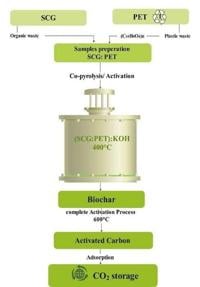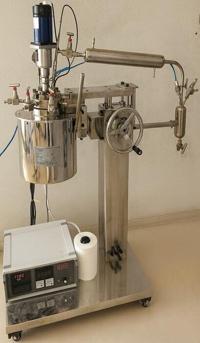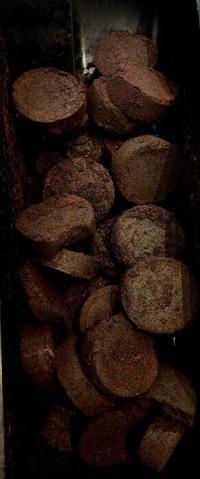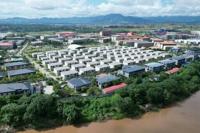
(Photo by Becca Mitchell via Pexels)
By Stephen Beech
Coffee and plastic waste have been turned into an eco-friendly way of reducing carbon emissions.
The new technology, designed to capture carbon dioxide from industrial processes before it is released into the atmosphere has been patented by scientists.
The patent, filed in March this year and published in August, outlines a novel and highly detailed method with promising potential to reduce environmental pollution, industrial emissions, and anthropogenic COâ.
Carbon dioxide is one of the primary greenhouse gases driving global warming and climate change.
Rising atmospheric COâ levels pose serious risks to both the environment and human health, say scientists.

Coffee waste (SCG), blended with plastic waste (PET), is engineered into activated carbon for climate solutions. (Haif Aljomard via SWNS)
The new approach utilizes a blend of spent coffee grounds, polyethylene terephthalate (PET) - a common plastic used in packaging - and potassium hydroxide, a strong alkaline chemical.
The components together form an effective material for COâ adsorption, say the research team based in the United Arab Emirates.
Globally, an estimated eight million tons of spent coffee grounds are discarded annually, mostly ending up in landfills where they emit methane and other greenhouse gases.
By repurposing the waste, researchers at the University of Sharjah say their new method not only captures COâ but also contributes to sustainable waste management.
PET, a member of the polyester family, is widely used in consumer packaging, while potassium hydroxide serves as a powerful activating agent in the process, enhancing the material’s ability to trap carbon.

Reactor driving the carbonization of coffee and plastic waste into high-performance carbon. (University of Sharjah via SWNS)
The patent marks a "significant" step forward in the development of eco-friendly technologies aimed at mitigating climate change, according to the research team.
Study leader Dr. Haif Aljomard said: “What begins with a Starbucks coffee cup and a discarded plastic water bottle can become a powerful tool in the fight against climate change through the production of activated carbon.”
She explained that the innovation centres on producing activated carbon through the heating of spent coffee grounds and polyethylene terephthalate plastic waste, using potassium hydroxide (KOH) as the activating agent.
Dr. Aljomard says the process operates at an "eco-friendly" activation temperature of 600⯰C, offering a sustainable way of reducing carbon emissions.
She emphasised that the patent presents "significant" findings in the synthesis of activated carbon from waste materials, highlighting the effectiveness of chemical activation, the importance of surface area and pore structure, and the waste-to-resource approach that underpins the technology.
Dr. Aljomard said: “This invention repurposes two abundant waste streams - coffee and plastic - into a high-performance adsorbent."

Coffee waste from Starbucks in Dubai, UAE, co-pyrolyzed with PET plastics to produce activated carbon for CO2 capture. (Haif Aljomard via SWNS)
She added: “The resulting activated carbon shows strong potential for capturing COâ from fossil fuel-based energy systems, contributing to the reduction of air pollution.”
The research team says their method yields activated carbon with high COâ adsorption capacity, making it suitable for industrial applications.
They also highlighted the low production costs, thanks to the affordability and availability of raw materials.
Co-inventor Professor Chaouki Ghenai, a sustainable and renewable energy specialist at the University of Sharjah, said: “Transforming spent coffee grounds and plastic waste into high-quality activated carbon offers economic, social, and environmental benefits.
“Through carbonisation and chemical activation, we eliminate the need to landfill these materials, protecting the environment from their harmful effects.”
He says the new technology has "wide-ranging" potential across various industrial processes including gas purification and drinking water filtration, as well as swimming pool, aquarium, wastewater, and sewage treatment systems.
Ghenai added: “There is an urgent need for effective and sustainable technologies to capture and reduce carbon dioxide emissions from sources such as fossil fuel combustion, industrial processes, and power generation."





















(0) comments
Welcome to the discussion.
Log In
Keep it Clean. Please avoid obscene, vulgar, lewd, racist or sexually-oriented language.
PLEASE TURN OFF YOUR CAPS LOCK.
Don't Threaten. Threats of harming another person will not be tolerated.
Be Truthful. Don't knowingly lie about anyone or anything.
Be Nice. No racism, sexism or any sort of -ism that is degrading to another person.
Be Proactive. Use the 'Report' link on each comment to let us know of abusive posts.
Share with Us. We'd love to hear eyewitness accounts, the history behind an article.